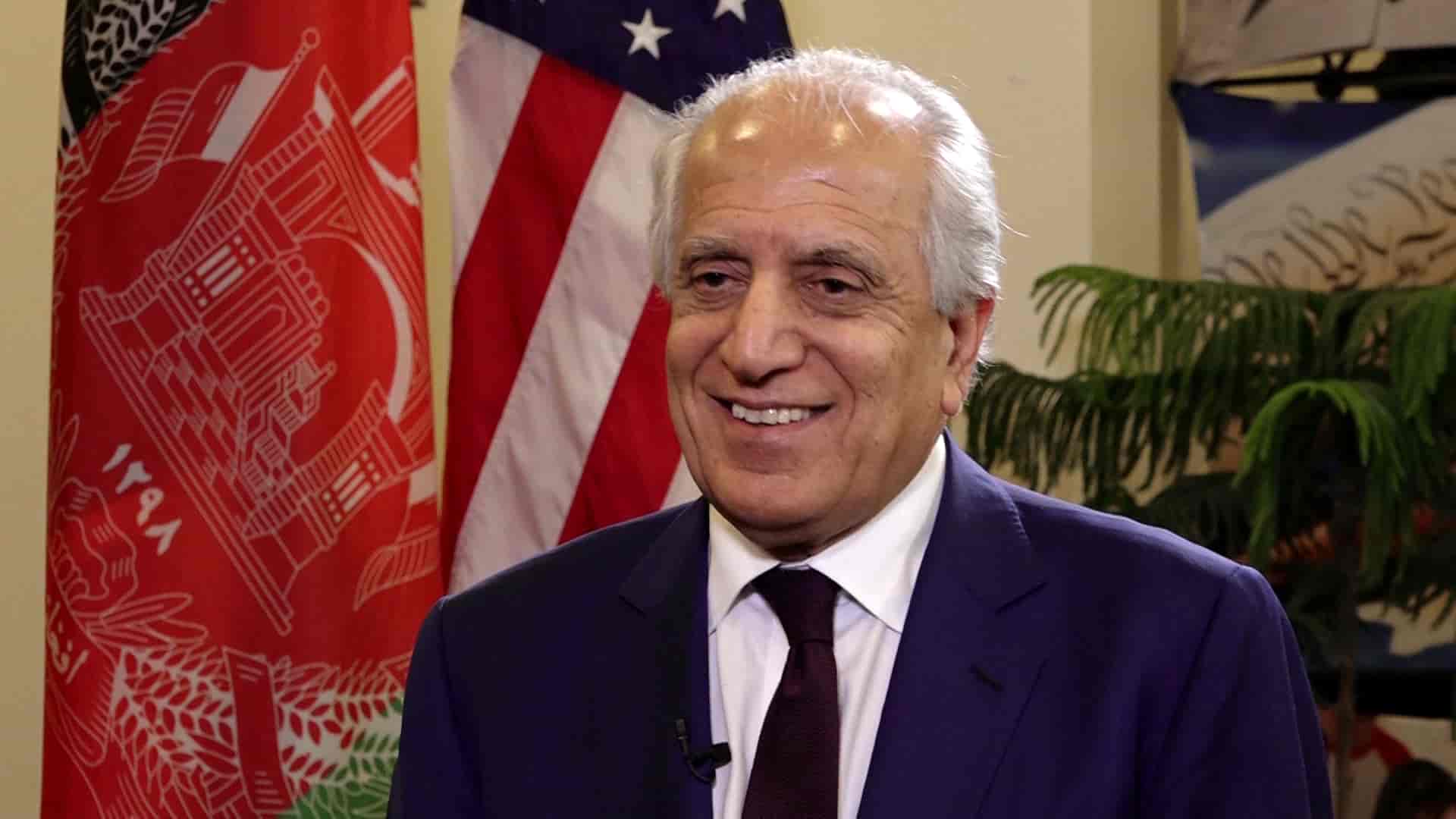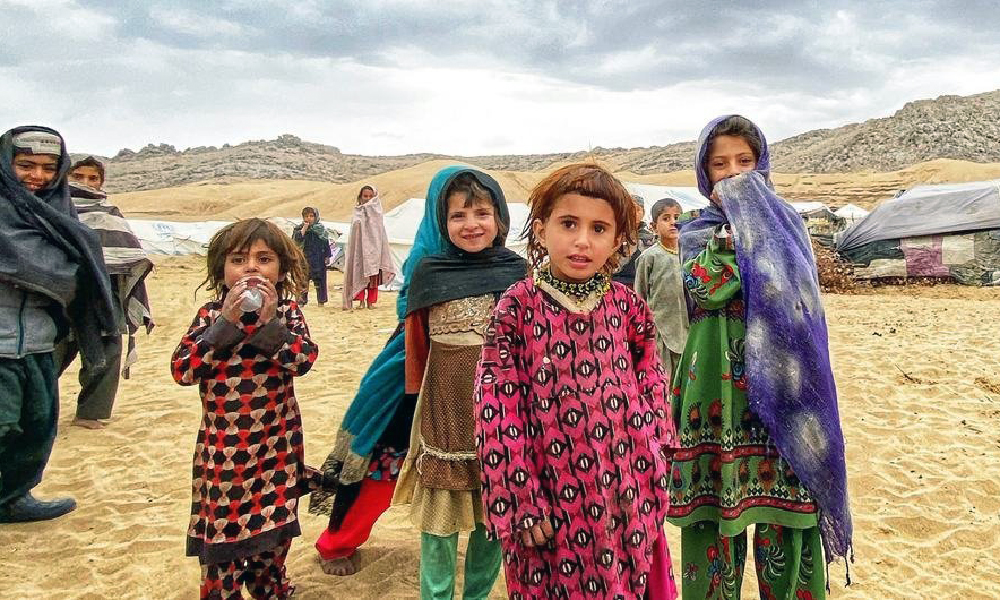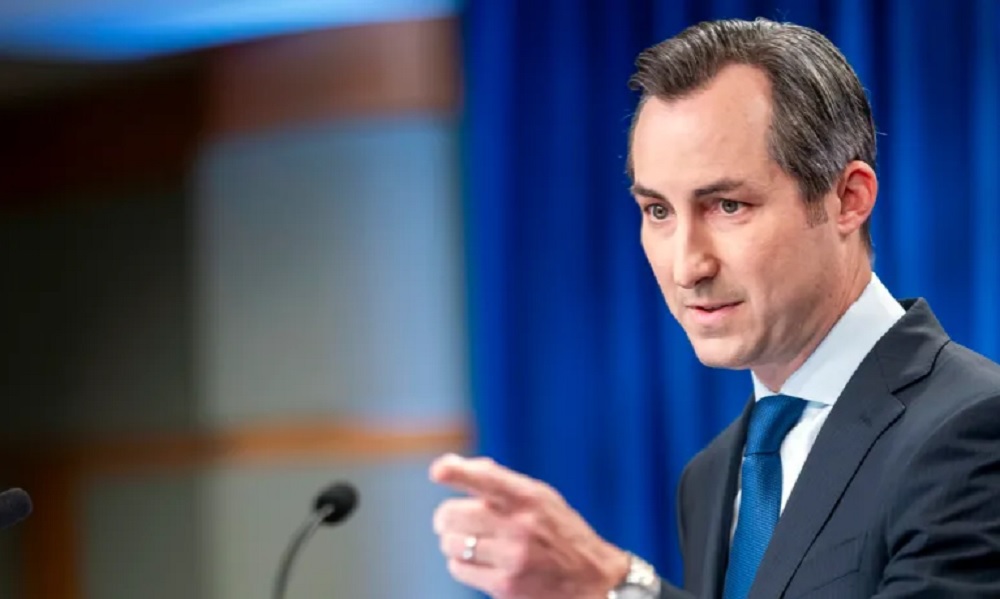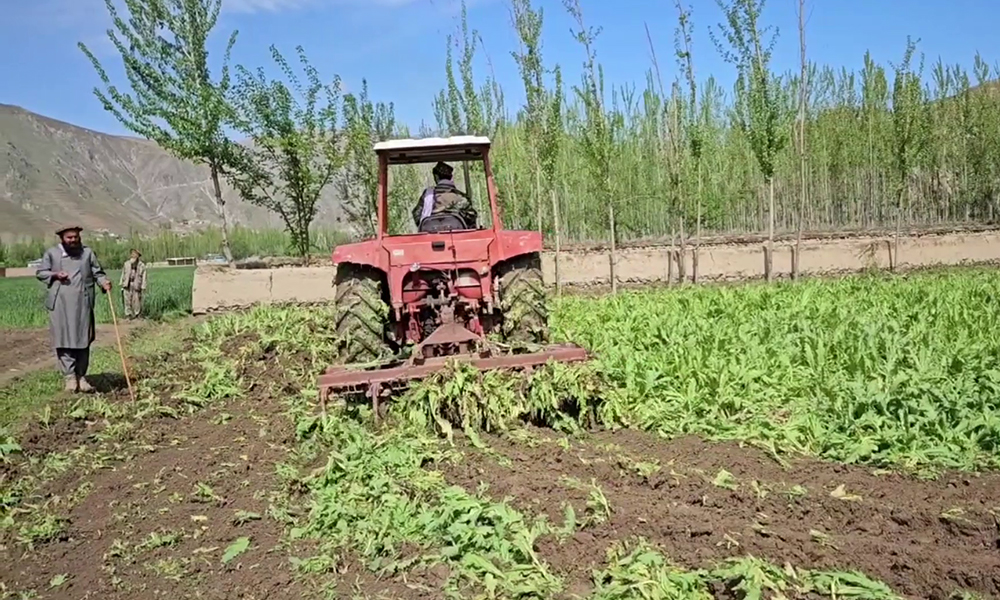Latest News
Full Transcript: Khalilzad’s Exclusive Interview After UAE Meeting

 The U.S. special envoy for Afghanistan Reconciliation Zalmay Khalilzad has told Ariana News’ Sharif Hassanyar that they have talked about a three-month ceasefire for addressing the issues through joint intra-Afghans dialogues in the meeting with Taliban officials in UAE.
The U.S. special envoy for Afghanistan Reconciliation Zalmay Khalilzad has told Ariana News’ Sharif Hassanyar that they have talked about a three-month ceasefire for addressing the issues through joint intra-Afghans dialogues in the meeting with Taliban officials in UAE.
He said the ceasefire proposal was suggested by Saudi Arabia and UAE officials at Abu Dhabi meeting.
Here is the full transcript of the exclusive interview:
Q: Thank you! For the first question, could you please tell us the latest details on your Abu Dhabi visit and peace talks?
ZK: Well, the meeting in Abu Dhabi was a good meeting. Pakistan, the UAE, and Saudi Arabia in cooperation with each other are trying to bring the Taliban and the Afghan government to the negotiating table, and to agree among themselves on the next steps needed for peace. Separate talks took place between these countries and the Afghan government delegation, and these countries and the Taliban. Unfortunately, the Taliban did not agree to meet with the Afghan government delegation, which I think was a mistake on their part, and left a negative impression on the participating countries, including the United States.
Q: You had some meetings with the Taliban. What were their red-lines at the meetings?
ZK: The Taliban have red-lines. They want to reach an agreement on the existence of foreign forces in Afghanistan.
Q: What was your answer and what is the red-line for the U.S.?
ZK: The United States’ red-line is that international terrorists like Al-Qaida and ISIS must not be able to use Afghan territory against the U.S. and the international community. To reach this goal, it is necessary to reach an intra-Afghan peace agreement.
Q: If your meetings with the Taliban achieve a positive result, what type of government will the people of Afghanistan get? An Islamic Emirate or an Islamic Republic?
ZK: The formation of the future government system is a decision for Afghans, which they must make for themselves. We are not in favor of an Islamic Emirate in Afghanistan and the Taliban said that they do not want to go back to the situation before 9/11. They said that they want to meet their fellow Afghans and reach an agreement on the political situation of Afghanistan. They prefer to discuss and solve security issues first. Our position is that if they really want peace… if they intend to solve the problem through political negotiation, and do not want a return to the past forty year history of Afghanistan when one group forced others to accept their political will, that was a failed policy and caused the war to continue. The solution is that they should sit together and reach an agreement on the future political situation with mutual respect and acceptance.
Q: During your negotiations with the Taliban, did you discuss an interim government or postponing the elections?
ZK: No. I understand there are many discussions going on about this issue in the media, but a plan for the political future of Afghanistan is an issue Afghans must decide together. We did not talk about an interim government or postponement of the elections, not even a single sentence or two. Some want to create tension between the U.S. and Afghanistan. Nothing was said on these topics.
Q: Were a ceasefire and prisoner release discussed in the two-day meetings in Abu Dhabi?
ZK: We talked about a ceasefire.
Q: Was it yours or the Taliban’s demand?
ZK: It was the UAE and Saudi Arabia’s suggestion. They proposed that a three-month ceasefire would provide an opportunity so that all issues could be addressed through joint intra-Afghans dialogues. The Taliban replied that they are not able to decide or agree with the complete proposal and asked for more time to go back and consult with their leadership. We will see what the result will be. We told them, if they want peace or if they are serious about peace, they should sit with the Afghans and respond as soon as possible to the Emirati and Saudi suggestion. If they want to fight or continue fighting, we assured them that the United States will stand with the government and the people of Afghanistan.
Q: You had meetings with GNU leaders last night. What were the details of the meeting and what was the demand of the Afghan government?
ZK: My aim was to update them on my recent trips after I was in Afghanistan, including Russia, Central Asia, Brussels, and the meetings I had in Pakistan and Abu Dhabi. It was a good meeting. Dr. Ghani and Dr. Abdullah were both present in the meeting and it was a good meeting.
Q: To compare both sides, the Afghan government and the Taliban, which side places more emphasis on and is being more honest about the peace process?
ZK: Well, I do not have doubts about the government, as I know Dr. Ghani and Dr. Abdullah. The people of Afghanistan, first of all, want peace. The war lasted for forty years; people have the right, anywhere in the world, to have peace, but in Afghanistan, especially… this war has endured for forty years there. The leadership of Afghanistan is in close contact with the people and they have experienced their own problems with their own people, and believe that they want peace. It does not mean peace is an easy task, there are no problems, there are no challenges…there are other issues, elections, for example. But I do not doubt that the people of Afghanistan are demanding peace as a whole. Regarding the Taliban, I have one question. Are they serious or not? They claim that they are serious, so let’s see what steps they take in practice, such as meeting with other Afghans, accepting and tolerating each other, mutual respect… This is still questionable… their disagreement in Abu Dhabi, which I think was a mistake… that will end against their favor. There is one question, how serious they are about peace.
Q: Do you think we will reach a peace agreement before the presidential elections, or if elections are held, will Afghanistan experience more five years of war? Or will there be a possibility for a peace agreement after elections?
ZK: I think it would be great if we could reach a peace deal before the elections. But it doesn’t only depend on Afghanistan’s government. It depends on the Taliban too. The Taliban can get ready for peace and elections at the same time. It would be great if a peace deal occurs before the elections.
Q: Do you think it will happen before the elections?
ZK: Yes, why not? I already mentioned the Emirati and Saudi proposal for a three-month ceasefire before the elections. The Afghan government, the Taliban, and other parties shared their opinions on a ceasefire and it will be good if they work and implement it. If this war ends, the sooner the better, as well as ending the killing. We know there are many complexities and challenges, and this war has deep roots. There are not only domestic factors but regional factors as well. That is why, when I say that efforts should be made, it does not mean it will happen immediately. But my personal effort and the United States’ efforts are aimed at bringing peace as soon as possible.
Q: After your meeting with the President and CEO, the National Security Advisor wrote on his Twitter account that no country can form a government system for Afghanistan and that the Afghan government is based on the constitution. Apparently, his tweet indicated his concern after your meetings. What do you say in response?
ZK: Well, I understand that there are some concerned people and that there are some concerns. Some concerns are right, and some others are due to lack of correct and sufficient information…
Q: Didn’t you meet last night with president Ghani and CEO Abdullah?
ZK: …I don’t know, based on my conversation with Dr. Ghani and Dr. Abdullah, they didn’t think that we want to form a different system for Afghanistan. The time for that is already past and Afghanistan is in a different place compared to the past. As I mentioned earlier, there was no discussion of any political issues, including elections, the Afghan government system, or changes in the constitution. We did not talk about these issues. Those who do not have information may have concerns, and sometimes there are some comments, but those who have information and are involved have no reason for concerns that the U.S government wants to represent Afghanistan… First, I am not a representative of Afghanistan. I am representative of the United States government and the United States does not want, it is not its program, it is not its policy, to replace Afghans in the internal affairs that belong to them.
Q: To what extent do you think that the Taliban negotiators are able to make independent decisions in peace talks? In the past, the Taliban could not decide about peace without Pakistan.
ZK: Well, let’s see what happens. During the last few months, I started a direct effort with Pakistan and regional partners to encourage Pakistan to cooperate in the Afghan peace process, to support the negotiations between the Afghan government and Taliban, and to take practical steps in this regard. I can say that in the Abu Dhabi meetings, Pakistan’s stance was that the Taliban should meet with the Afghan government and talk about their issues. Like the U.S., Saudi Arabia, and UAE, Pakistan can also play a role in peace talks with the Afghan government while the war continues. Let’s see what practical steps Pakistan takes in the coming days and weeks.
Q: For my last question, in your meetings with the Taliban, to what extent were issues such as the field I am working in, freedom of press, and also women’s rights and human rights, considered? Are these issues a red-line for the United States?
ZK: Well, we did not talk about these issues with the Taliban because they are Afghanistan’s internal issues. We discussed security and they wanted to talk about terrorism, and the presence of foreign forces in Afghanistan. I would like to assure the people of Afghanistan that as far as the United States is concerned, the United States is in favor of a democratic system where every Afghan’s rights are respected, where everyone has equal rights and responsibilities under the law. Countries are successful when there is respect for freedom of speech and press, and these are the essential elements for a successful Afghanistan. Without a doubt, the United States supports these issues.
Sharif Hassanyar: Thank you very much for your time and this opportunity.
Zalmay Khalilzad: Thank you too. Stay safe!

Latest News
250,000 Afghan children need homes, food, education after returning from Pakistan

In the wake of an announcement by Pakistan that it intends to start Phase Two of deportations of Afghans, Save the Children said Thursday that almost a quarter of a million Afghan children need proper homes, food, and access to education after returning from Pakistan in the past seven months.
In a statement issued by the organization, Save the Children said more than 520,000 Afghans have returned from Pakistan since September last year, after Pakistan said all undocumented foreigners must leave the country voluntarily or face deportation.
Nearly half of all the returnees are children.
A survey by Save the Children of families who have returned to Afghanistan – and the communities who are hosting them – found that nearly all (99%) do not have enough food for the next one to two months.
About three-quarters of returnees and families in host communities reduced portion sizes or restricted the food consumption of adults so small children could eat.
About 40% of returnees and host families surveyed had to borrow food or rely on friends and relatives for at least three days a week – with 13% of returnees and 9% of host families saying they had to get food from others every day.
Almost 8 million children in Afghanistan – or one in three – are facing crisis levels of hunger.
Nearly one in six families live in tents, according to the survey, with most returnees having little or no means to support themselves.
Only a third had managed to bring assets back with them from Pakistan.
Nearly half (47%) said there were no jobs available in Afghanistan, with 81% saying that they do not have any skills that could lead to employment.
Almost two thirds (65%) of children who have returned to Afghanistan have not been enrolled in school. The majority (85%) told Save the Children that they don’t have the necessary documents to register and enroll in school.
In Pakistan, more than two thirds of these children had been attending school.
Arshad Malik, Country Director for Save the Children in Afghanistan, said: “Families are returning to Afghanistan with virtually nothing. Most are relying on relatives or friends to support them – and these communities already have little to support themselves.
“The return of so many people is creating an additional strain on already overstretched resources. Children need support and stability. Many undocumented Afghan children were born in Pakistan – Afghanistan is not the place they call home,” he said.
He added that in addition to the returns from Pakistan, 600,000 Afghans arrived from Iran last year. Also, “families have been forced from their homes by multiple disasters, including the series of earthquakes in Herat and the ongoing drought. Afghanistan is also now home to the second largest number of internally displaced people in the world – or roughly 1 in 7 people,” Malik said.
According to him, Afghanistan not only needs urgent funding from international donors and governments – but also needs long term, community-based solutions to help all displaced Afghans rebuild their lives.
Latest News
US asks IEA to ensure Afghan soil not used by terrorists

The US State Department on Thursday asked the Islamic Emirate of Afghanistan (IEA) to ensure that Afghanistan is not used to support terrorist groups, movement of terrorists or acts of terrorism.
A State Department spokesman told Geo News that Washington has “been very clear that we will judge the Taliban (IEA) by what they do, not what they say.”
“The Taliban (IEA) wants international legitimacy. This requires the Taliban (IEA) to meet their commitments to the international community,” the official said.
The spokesperson said the most enduring interest for the US in Afghanistan was to ensure that it never again became a safe haven for terrorists, especially for those who wished harm to the US or its partners or allies.
“We are in regular communication with Pakistani leaders as a part of our partnership on counterterrorism issues. We continue to discuss Afghanistan in detail, including through our annual counterterrorism dialogue and other bilateral consultations,” the official said.
Islamabad has time and again urged Kabul to take meaningful action against terrorists using Afghan soil to launch attacks inside Pakistan.
However, the IEA has repeatedly rejected claims of militant groups in the country and have said they will not allow any group to threaten a country from Afghanistan.
On Tuesday, the Pakistan Army’s top commanders were briefed on how terrorist groups operating from Afghanistan pose a threat to regional and global security, besides acting as proxies against Pakistan and its economic interests, especially the China-Pakistan Economic Corridor (CPEC).
A day ago, the Inter-Services Public Relations (ISPR) said security forces had killed seven terrorists trying to infiltrate the Pakistan-Afghanistan border in the North Waziristan district.
In a statement, the military’s media wing had said the security forces on April 16 had detected a movement of a group of seven terrorists near the border in the Spinkai area of Ghulam Khan in the tribal district, Pakistan’s The News reported.
Latest News
Over 6,000 acres of land cleared of poppies in Badakhshan

Badakhshan Police Command says it has cleared more than 6,000 acres of poppy fields in northern Badakhshan province.
The anti-narcotics department of Badakhshan Police Command says that since the beginning of the campaign to destroy the poppy fields in this province, they have cleared more than 6,000 acres of land.
According to these officials, poppies have however been planted in more than 10 districts this year.
The anti-narcotics department of the Badakhshan Police Command says that the campaign to destroy the poppy plantations started two months ago and continues.
According to the officials, during this period, 6,300 acres of land has been cleared.
Some of the farmers whose fields were destroyed say that poppy is more profitable than other agricultural products, but now that their land has been cleared, they want alternative crops.
According to the officials, Kishim, Argo, Darayimand and Jurm districts are among the districts where poppies are cultivated.
-

 Sport5 days ago
Sport5 days agoACL draw to be broadcast live on ATN channels
-

 Sport4 days ago
Sport4 days agoACL fever grows as fixtures finalized
-

 World4 days ago
World4 days agoUS will not take part in any Israeli retaliatory action against Iran
-

 Latest News4 days ago
Latest News4 days agoOver 50 people dead in traffic accidents over Eid
-

 Latest News4 days ago
Latest News4 days agoUS identifies Kabul airport suicide bomber
-

 Business4 days ago
Business4 days agoAfghanistan-Kazakhstan chamber of commerce opens in Herat
-

 Latest News4 days ago
Latest News4 days agoGood rains enable DABS to increase power production in Kabul
-

 World3 days ago
World3 days agoIsraeli military vows response to Iran attack as calls for restraint mount
















